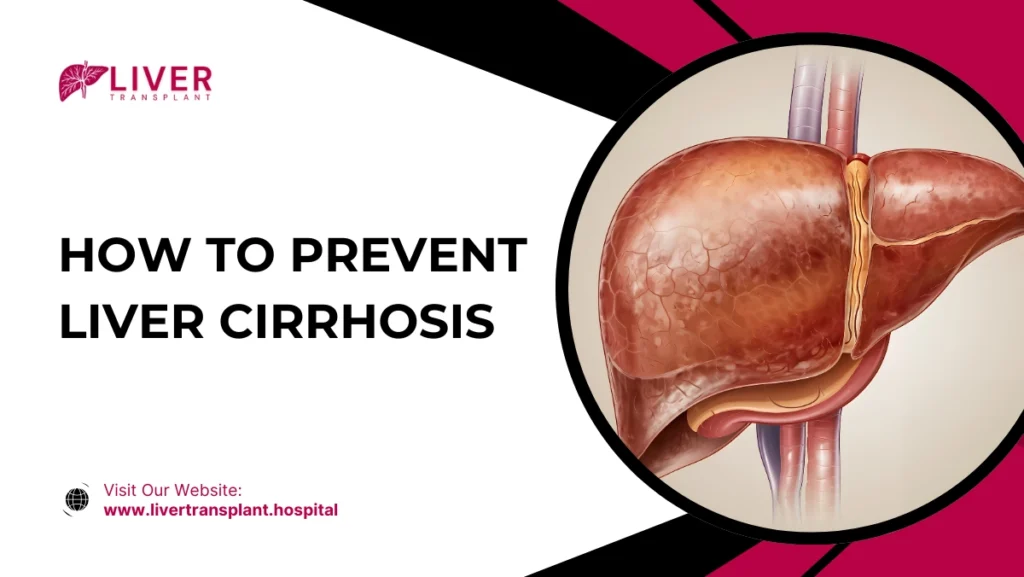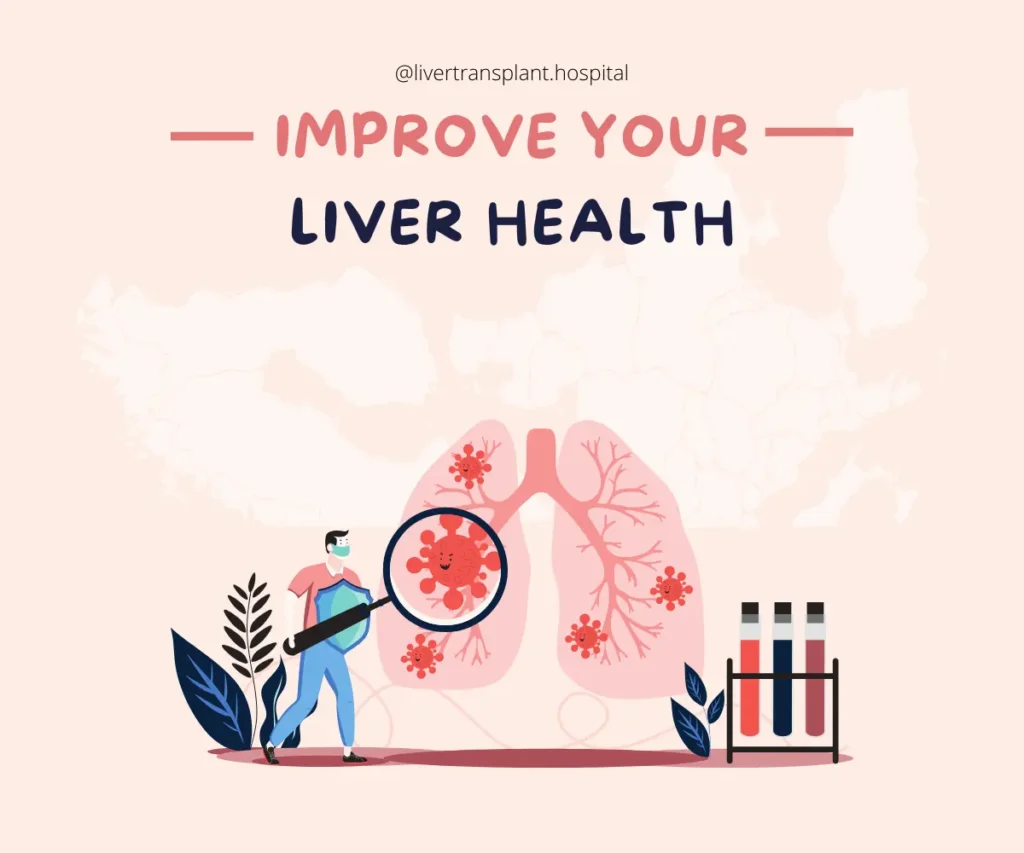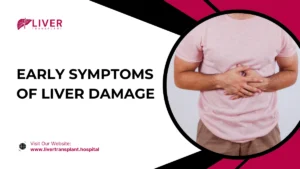How to prevent liver cirrhosis is crucial for maintaining long-term health and well-being. This condition, marked by irreversible liver damage, can lead to serious health complications if not addressed properly.
Liver Cirrhosis
Liver cirrhosis is a serious condition, but there are ways to prevent it from developing or getting worse. Understanding how to prevent liver cirrhosis is key to maintaining a healthy liver and avoiding complications. In this blog, we’ll explore what liver cirrhosis is, its causes, risk factors, complications, and most importantly, how to prevent cirrhosis and liver failure.
Causes of Liver Cirrhosis
To understand how to prevent liver cirrhosis, it’s crucial to recognize its causes. Liver cirrhosis develops due to various factors, often related to lifestyle choices and medical conditions:
- Chronic Alcohol Abuse: Excessive alcohol use leads to liver damage, making it crucial to limit consumption to prevent cirrhosis.
- Hepatitis B and C: Chronic viral infections cause liver scarring, emphasizing early detection and treatment to avoid cirrhosis.
- Non-Alcoholic Fatty Liver Disease (NAFLD): Fat buildup in the liver, linked to obesity and diabetes, contributes to cirrhosis progression.
- Autoimmune Hepatitis: The immune system attacks liver cells, requiring prompt treatment to prevent further damage and cirrhosis development.
By addressing these causes, strategies on how to prevent liver cirrhosis can be more effectively implemented, emphasizing the importance of lifestyle modifications, regular health screenings, and management of underlying health conditions.
Risk Factors for Liver Cirrhosis
To effectively learn how to prevent liver cirrhosis, understanding the risk factors is essential. Common risk factors include:
- Chronic alcohol consumption: Excessive drinking over time can severely damage the liver, leading to cirrhosis.
- Hepatitis B and C infections: Chronic viral infections are significant contributors to liver damage.
- Non-alcoholic fatty liver disease (NAFLD): A condition common in obese and diabetic individuals that can lead to cirrhosis.
- Genetic disorders: Conditions like Wilson’s disease and hemochromatosis can lead to liver dysfunction and scarring.
- Toxic medications: Certain drugs, when used long-term, can harm the liver.
By addressing these risk factors, you can learn how to avoid cirrhosis, reduce liver damage, and ultimately understand how to prevent cirrhosis from getting worse. This proactive approach is key to maintaining optimal liver health and avoiding future complications.
Complications of Liver Cirrhosis
Untreated cirrhosis can result in several life-threatening complications. Understanding how to prevent liver cirrhosis from progressing to these stages is crucial. Key complications include:
- Liver cancer: Cirrhosis increases the risk of hepatocellular carcinoma, a deadly liver cancer.
- Liver failure: Cirrhosis can lead to complete liver failure, making it life-threatening.
- Portal hypertension: Increased pressure in liver blood vessels causes bleeding and swelling.
- Variceal bleeding: Weak veins in the esophagus may rupture, leading to severe internal bleeding.
- Kidney failure: Liver damage can impair kidney function in advanced cirrhosis.
Taking preventive measures early can help avoid these severe complications and maintain liver health.
How to Avoid Cirrhosis
- Control Alcohol Consumption
Minimizing or eliminating alcohol intake is a crucial step in how to avoid cirrhosis. Alcohol abuse is a leading cause of liver damage, so reducing or stopping consumption can significantly lessen the risk. - Maintain a Balanced Diet
Prioritize a diet high in fruits, vegetables, lean proteins, and whole grains to prevent fatty liver disease, which is essential in how to avoid liver failure. A healthy diet plays a key role in supporting overall liver function and avoiding further complications. - Regular Exercise
Engaging in physical activities like walking, cycling, or swimming helps maintain a healthy weight and reduces liver fat, which is vital in how to avoid cirrhosis. Staying active can prevent conditions that lead to liver damage. - Monitor Medication Intake
Using prescription and over-the-counter drugs judiciously is important for those learning how to avoid liver failure. Certain medications can strain the liver, so it’s important to use them carefully and under medical supervision. - Regular Medical Checkups
Early detection and management of liver conditions are essential in preventing cirrhosis and liver failure. Routine health screenings are vital in how to avoid cirrhosis and catching liver problems early, before they worsen. - Vaccination and Hygiene
Getting vaccinated against hepatitis and practicing good hygiene can prevent infections that lead to liver damage, which is crucial in how to avoid liver failure. Keeping your liver protected from infections is an important preventative measure.
How to Prevent Cirrhosis from Getting Worse
- Regular Monitoring: Keep track of liver function through routine blood tests and imaging studies. Regular check-ups are crucial in how to prevent liver cirrhosis from advancing.
- Medication Adherence: Follow prescribed treatment regimens to manage symptoms and slow disease progression. This is a key factor in how to avoid cirrhosis from worsening.
- Avoid Alcohol: Completely abstain from alcohol to halt further liver damage. This step is essential when understanding how to avoid liver failure and prevent additional liver injury.
- Healthy Lifestyle: Maintain a balanced diet and exercise regularly to improve overall liver health. By focusing on these habits, you can learn how to prevent cirrhosis from getting worse and safeguard your liver.
Limit Alcohol Consumption
One of the primary causes of liver cirrhosis is excessive alcohol consumption. To prevent cirrhosis, it’s essential to:
- Reduce alcohol intake: For men, limit to two drinks per day, and for women, one drink per day.
- Seek support for alcohol dependence: Consider counseling or rehabilitation if reducing alcohol is challenging.
- Stay hydrated: Drinking water helps the liver process toxins more efficiently.
- Follow a balanced diet: Include foods rich in antioxidants and avoid excessive sugar and processed foods.
By making these lifestyle adjustments, you can significantly lower the risk of cirrhosis and protect overall liver function.
How to Prevent Liver Failure
Preventing liver failure is closely tied to managing liver health through proactive lifestyle choices. Here’s how to prevent liver failure:
- Avoid excessive alcohol consumption to reduce liver strain.
- Get vaccinated: Protect yourself from hepatitis A and B, common viral causes of liver disease.
- Limit exposure to toxins: Avoid overuse of medications like acetaminophen, which can lead to liver damage.
- Maintain a healthy weight: Obesity is linked to non-alcoholic fatty liver disease (NAFLD), a risk factor for cirrhosis and liver failure.
- Eat a liver-friendly diet: Emphasize fruits, vegetables, and lean proteins while minimizing trans fats and processed foods.
- Regular check-ups: Early detection of liver disease increases the chance of successful treatment.
Making these preventive choices can help ensure that liver function remains strong and reduce the risk of liver failure.
Conclusion
Understanding how to prevent liver cirrhosis is vital for protecting your health and avoiding complications like liver failure. By managing risk factors, following a healthy lifestyle, and staying in touch with your healthcare provider, you can maintain good liver health and prevent further damage. Take control of your health today by following these simple steps on how to prevent liver cirrhosis and how to avoid cirrhosis from getting worse.






